'Lukashenka Was Warned About Further Reaction'
25- 22.04.2024, 14:02
- 54,014
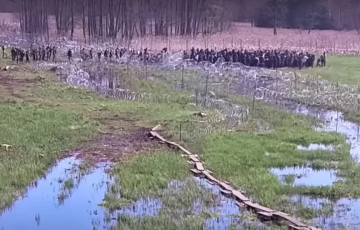
The regime's self-preservation instinct was activated.
Belarus has steadily increased pressure on the EU border in recent weeks. Attacks by illegal migrants have so far affected Lithuania to a lesser extent, but an increase in attempts at illegal entry has been noted in Latvia. A mass such assault on the Polish border was recorded a few days ago. What to expect in the near future and is there a risk of a new round of the migration crisis? Novaya Gazeta Baltics asked Belarusian sociologist Henadz Korshunau, he closely monitors and analyzes the situation.
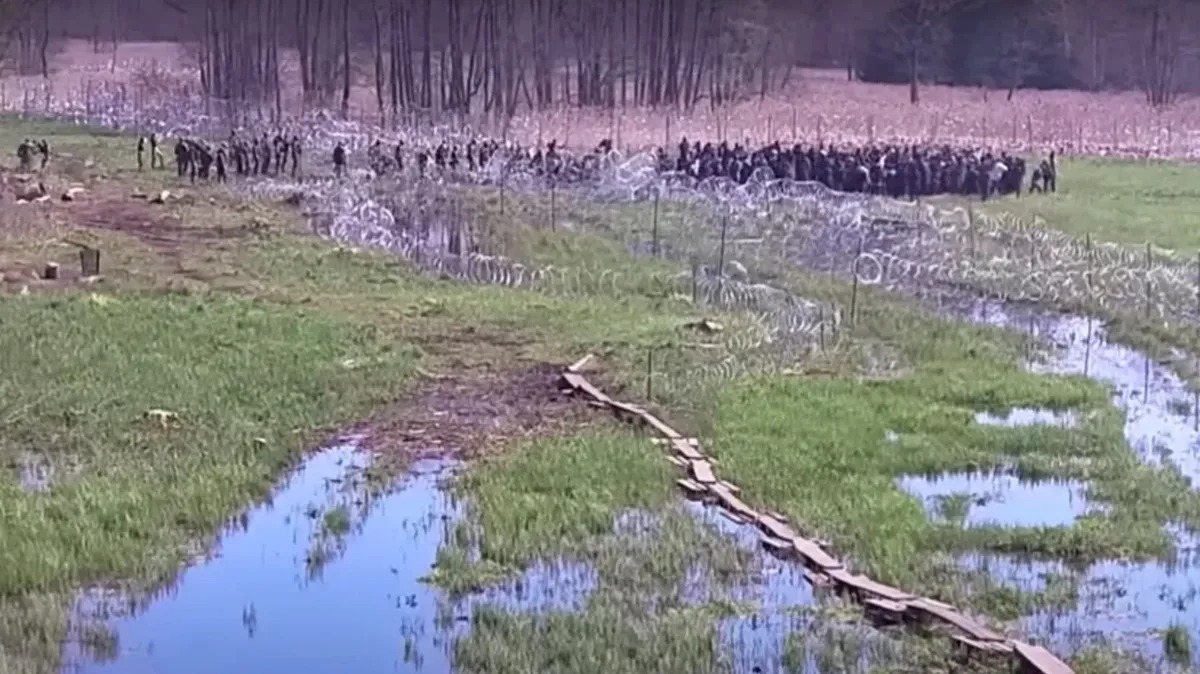
Poland gets. Latvia – less. They don't want to make Lithuania angry?
For some time, the topic of illegal migration has been overshadowed by the public agenda. It even seemed that the problem was losing its relevance. However, a recent case reminded us that the crisis is far from over.
On the morning of April 10, 2024, several hundred people, who had sticks, stones and some semblance of ladders in their hands, attempted to storm the Belarusian-Polish border. But having met resistance from the Polish border guards, they were forced to retreat deep into Belarus.
Henadz Korshunau shares his observations on the development of the migration crisis on Telegram. He says:"This attack attracts attention not only by its aggressiveness but also by its mass character. The case on the Belarusian-Polish border is a vivid illustration of the fact that a sharp escalation can occur at any time. Gathering a group of several hundred or even thousands of people for the autocratic regimes of Russia and Belarus is not a problem.
Another feature that catches the eye is the targeted selection of locations for the attacks. Since February of this year, when the growth of illegal attempts to enter the European Union (EU) began, the lion's share of incidents has been recorded by Poland, significantly less — by Latvia. Lithuania is still facing such cases."

"It seems that the Belarusian authorities still hope for the normalization of relations with Lithuania and do not want to anger this country," Henadz Korshunau explains the possible motives of the Lukashenka regime. "The second reason is not to interrupt the agenda beneficial to the official Minsk." Now Lithuanian politicians are actively promoting the topic of the radical Lithuanianism and threats to national security in connection with the number of Belarusians in the country. This creates pressure on the diaspora, which is in the interests of the authorities of the Republic of Belarus.
However, the greatest fears of the Belarusian regime are related to the possible closure of the remaining checkpoints on the border with Lithuania.
Recall that from March 1, the border crossings "Lavorishkes" (from the Belarusian side "Katlouka") and "Raigardas" ("Pryvalka") do not work. Thus, only two out of six checkpoints are currently operating. If the traffic stops there, it could be a significant blow for Lukashenka and his officials, who continue to make money from smuggling.
This scenario was seriously considered by the competent authorities of the Baltic States and Poland in August 2023. Then the parties agreed on two criteria under which the border with Belarus would be completely closed. First, an armed incident at the border. Secondly, an organized mass breakthrough of illegal migrants.
The dependence of migration attacks on statements, decisions and political events can be traced in a number of other cases. For example, when the NATO summit was held in Vilnius in July 2023, the number of attempts to illegally cross the Belarusian-Lithuanian border fell to a record low.
"I think the regime has a self-preservation instinct," believes Henadz Korshunau. "And those who manage this process undoubtedly have it." In addition, there must have been some communication channels through which unambiguous warnings were transmitted, which could lead to possible provocations.
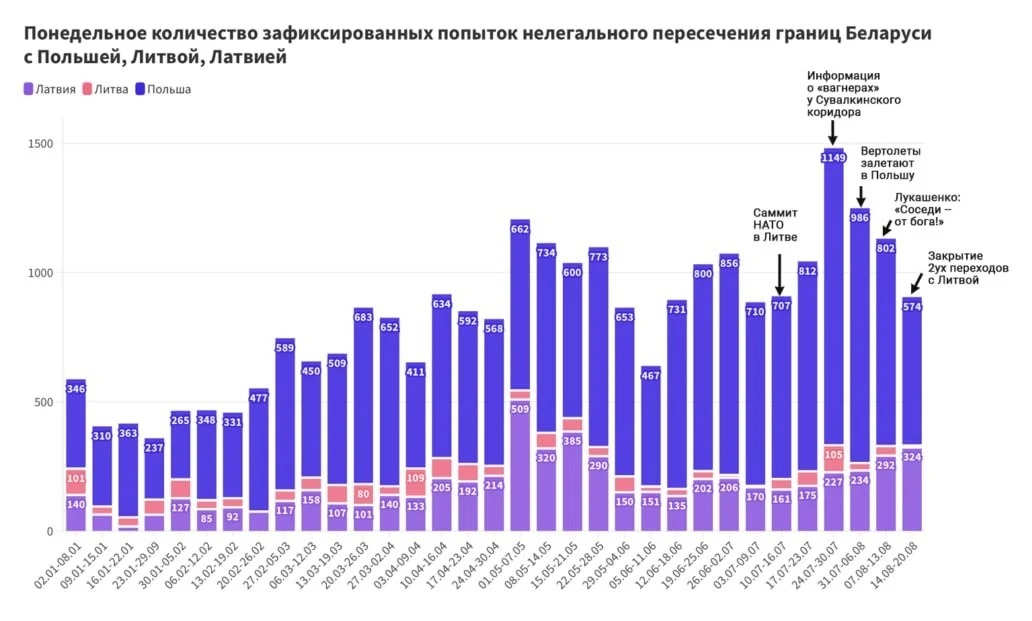
"The Belarusian regime provides a kind of support for the Russian invasion"
Over the past three years, Poland and the Baltic states have taken a number of measures, developed tactics, and made changes to legislation. There is a feeling that the problem has been stopped. Then what's the point of continuing the attack? Moral satisfaction that it is possible to cause inconvenience to "unfriendly countries"?
"Probably, the motive is more serious," the sociologist continues. "Lukashenka provided an alibi, positioning himself as an accomplice to aggression against the West. They say that Putin is waging war in Ukraine. And I help as much as I can, I use illegal migrants from third countries as a weapon.
The researcher believes that in this way the Belarusian regime carried out a kind of accompaniment of the Russian invasion of Ukraine. It could also be an attempt to destabilize the EU before a full-scale war.
This version is also supported by the situation developed the day before. In February 2022, 1,500 cases of attempts to break through the EU border from Belarus were recorded, in March almost twice as many — 2,700. When the autocratic regimes realized that they could not take Kyiv in three days, the situation was rolled back, and in April the statistics returned to the February values.
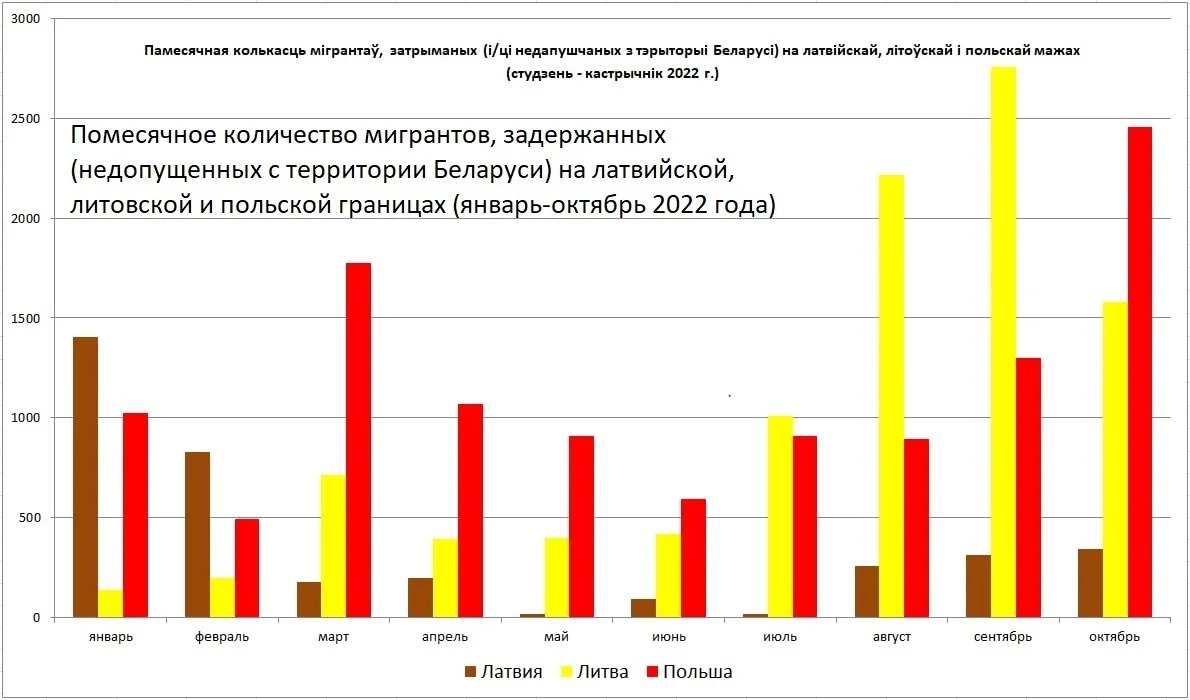
"It is widely believed that the migration crisis began after the forced landing of the Ryanair plane with Raman Pratasevich on board, or rather as a response to the harsh reaction of the West [Lukashenka literally said that he would not stop the flow of drugs and migrants — Ed.], — Henadz Korshunau recalls. "But statistics show that the number of illegal attempts to cross the border of the European Union from Belarus began to grow a few months before the incident with the plane." From January to May 2021, 189 migrants were detained by Lithuanian border guards. For comparison: for the whole of 2020, only 81 such cases were recorded. In 2019 — 46, in 2018 — 104.
There is no doubt, the sociologist believes, that the crisis is artificial, and there are many indirect and direct confirmations of this.
In recent years, infrastructure has been established to transport people seeking a better life in Europe to the borders with the EU.
Some deliver them to Moscow, others accompany them to Belarus, others send them directly to the border.
"There was a weaponization, when migrants are used as weapons," emphasizes the interlocutor of Novaya Gazeta Baltics. "I suspect that the calculation was based on the polarization of opinions in Europe and on the subsequent split: on the one hand, there would be countries that suffered a migration blow, on the other — the rest of the European Union." But it happened exactly the opposite: Poland and the Baltic states worked out mutual mechanics: communication, organizational and financial tools.
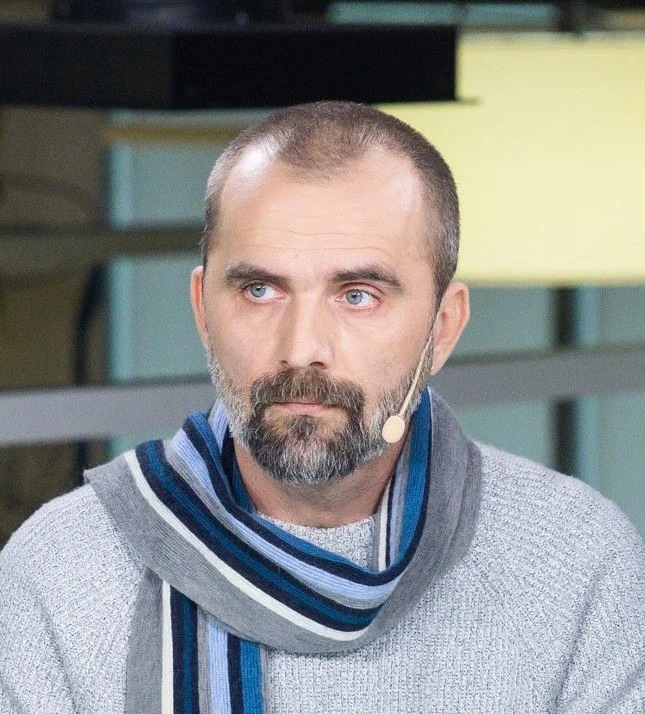
"Although the critical threats have been stopped, the problem of the migration crisis cannot be solved while Putin and Lukashenka are in power," Henadz Korshunau believes.
He emphasizes that due to the artificial nature of hybrid attacks, it is difficult to predict the future situation. The escalation depends on the will of the autocrats, who can organize an attempt to break through the EU border on a large scale at any time.
"If you look exclusively at the numbers, now there is an increase in the number of migration attacks and there is every reason to think that the trend will continue. This is especially noticeable when comparing March indicators. In 2022, 2.600 attempts were made this month, in 2023 — almost 3.500, in 2024 — more than 4.200," the sociologist quotes figures.
At the same time, one of the Lithuanian military experts, to whom Novaya Gazeta Baltics asked for comment, believes that Russia is not yet fully implementing migration pressure, since it cannot use it to its advantage. However, the analyst suggests closely monitoring the Middle East, where the number of refugees may increase sharply, which the Kremlin will certainly take advantage of.









